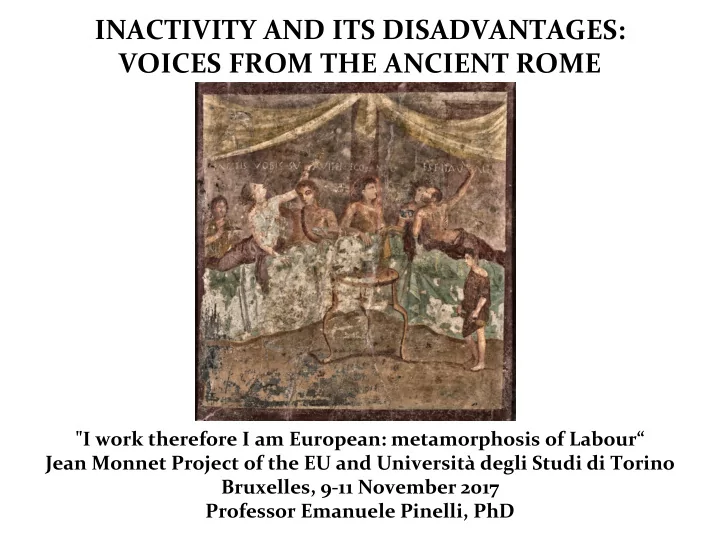

INACTIVITY AND ITS DISADVANTAGES: VOICES FROM THE ANCIENT ROME "I work therefore I am European: metamorphosis of Labour “ Jean Monnet Project of the EU and Università degli Studi di Torino Bruxelles, 9-11 November 2017 Professor Emanuele Pinelli, PhD
Robotic revolution is …and forces us to considered unavoidable by face the problem of most of public opinion… non-labour
Two possible scenarios: a)People excluded from production and service cycles will not have means of survival at all (clearly negative) b)Such people will receive their means of survival also without engaging themselves in any activity (looks positive)
What else society displayed a similar situation?
In the slavery-grounded society of Imperial Rome, the whole upper class had the concrete chance to choose an income-granted and consummation based lifestyle, called «leisure lifestyle», in alternative to service based «public lifestyle» and «philosophical lifestyle»
But what did wise men and educators of that society think about the «leisure lifestyle» option? (especially Stoics, the most successful among them) Did they find something dangerous inside it for both the Individual and the State?
L. A. Seneca, eight Letter to Lucilius: “Are you (had demanded astonished Lucilius) giving me the order to avoid crowd, to set me aside, and to be satisfied of this choice in my conscience? Where are, then, all your stoic precepts which command to be active even in the moment we die?"
«What?» (answers Seneca) «You think I am suggesting you inactivity?» «Me too, I don't waste in leisure any day, I sacrifice to studies even part of the night, I always fell asleep rather than going to sleep, and I do every effort to keep open my eyes while they're closing after a long eve»
Seneca had to apologize even just for his «philosophical lifestyle», showing its deep differences with a leisure / consummation one. In fact, Stoic (and generally Roman) mind recommended above all public engagement. «I’m doing this in the interest of future generations» (Eight letter to Lucilius) «When should a wise man choose retirement? When he’s sure that still then he could do something useful for future generations» (Essay on Retirement) «Hidden in retirement too, he shall desire to help Individuals and the Universe with his reason, his voice, his wisdom” ( Essay on Tranquillity of Soul)
How could help us eighty years wasted in inactivity? Action, not time, is the unity of measure of our life Seneca, Letter 93
Panetius Philosopher born in the island of Rodi (185 – 109 b.C.) Personal friend to Scipio He had brought in Roman Stoicism the worship of activity, above all public engagement
So a first principle in Stoic mind was: Man has the duty to be useful to society And a second one was: Effort is good for itself (not just for some future benefit) “I do every effort to keep open my eyes while they're closing after a long eve …”
In his eleventh Diatribe , Seneca’s contemporary Musonio Rufo claimed that for a wise man was not degrading, on the contrary, was quite recommended to gain his means of subsistence farming a field, even a field he didn't own.
He also sentenced that a wise man had the duty to get married and rise up lots of children ( Diatribes n° 13, 14, 15) Both agricultural and familiar activities satisfied Stoics criteria of being close to nature and useful for other men
Already Chrysippus, one of the fathers of Greek Stoicism (+205 b.C.), had recommended both agricultural and familiar activity In Imperial Roman age, he had been quoted about this topic by Philo Judaeus inside a commentary on the first chapters of Genesis
But none among the Stoics accorded legitimacy to an inactive (or better, based on consummation rather than on service) lifestyle. Otherwise, such a choice wouldn’t be innocent at all. Refusing to live as a wise man meant becoming an element who weakened society
“ Transfuga a lege, rebellis et contumax, nullius rei iustorum aut bonorum particeps, inimicus humanitatis et communitatis" “Outlaw, rebel and fugitive, not involved in any righteous or good deed, enemy of humanity and community” called him Chrysippus, according to Philo.
In conclusion: Though the whole upper class of Imperial Rome had the chance to choose a lifestyle based on consummation and inactivity (or perhaps because of it?) Stoics firmly rejected this option. On the other hand, Stoics considered noble and recommended some activities, like taking care of family or doing intellectual research , which today we still rarely include among labour activities. Starting to do this could be a good first step to face the challenge of non-labor.
Emanuele Pinelli • Author • Professor of Philosophy • Maestro of Flute • Lives in Rome • Responsible citizen emmanuele.pinelli@gmail.com
Recommend
More recommend